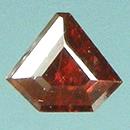|
|
||||||||||||||||
|
||||||||||||||||
|
Click on a letter above to view the list of gems. |
|
|
|
|
|
|
|
|
Wurtzite
|
|
|
|
|
|
Discovered in 1861 ; IMA status: Valid (pre-IMA; Grandfathered) |
||
|
|
||
|
Chemistry |
|
|
|
|
|
(Zn,Fe)S |
|
|
|
Zinc Iron Sulfide |
|
Molecular Weight: |
96.50 gm |
|
Composition: |
Zinc |
60.98 % |
Zn |
|
|
|
|
Iron |
5.79 % |
Fe |
|
|
|
|
Sulfur |
33.23 % |
S |
|
|
|
|
|
100.00 % |
|
|
|
|
|
|
||||
|
Classification |
|
|
|
|
|
Sulfides |
|
|
2/C.13-10 |
|
|
|
2
: SULFIDES and SULFOSALTS (sulfides,
selenides, tellurides; arsenides,
antimonides, bismuthides;
sulfarsenites, sulfantimonites,
sulfbismuthites, etc.) |
|
Related to: |
Wurtzite Group. Dimorph of Sphalerite. Epitaxial minerals: Chalcopyrite. Trimorphous with Matraite and Sphalerite. Polytypes 2H, 4H, 6H, 8H, 10H, 15R, 18R, and 21R are known. |
|
Members of Group: |
Wurtzite Group: Buseckite, Cadmoselite, Greenockite, Rambergite, Wurtzite |
|
Varieties: |
Polywurtzite, Voltzite |
|
Synonyms: |
Buergerite (of Gagarin and Cuomo), Hurlburtite (of Gagarin and Cuomo), Spiauterite |
|
|
|
|
Crystal Data |
|
|
|
|
|
Crystals to 1.5 cm, commonly hemimorphic pyramidal {5052} and {1011}; also short prismatic to tabular {0001}; typically striated horizontally on {1010} and {1011}. The polytypes show steepening of the pyramid as the repeat distance increases along {0001}. As concentrically banded crusts, fibrous or columnar. |
|
|
None |
|
|
|
|
|
Physical Properties |
|
|
|
|
|
Easy on {1120}; difficult on {0001}. |
|
|
Irregular/Uneven |
|
|
Brittle |
|
|
3.5 - 4.0 |
|
|
Density
: |
3.98 - 4.08; Faceted gems from Merelani measured 3.78 - 3.85. |
|
May fluoresce orange-red under LW UV. Faceted gems from Merelani were inert under both long- and short-wave UV. |
|
|
Not Radioactive |
|
|
|
|
|
Optical Properties |
|
|
|
|
|
Color : |
Deep reddish brown, orange-brown or dark brown to brown-black; yellow to dark brown internal reflections common in reflected light. |
|
Transparent to Translucent |
|
|
Luster : |
Resinous, brilliant submetallic on crystal faces |
|
2.356 - 2.378 Uniaxial ( + ) |
|
|
0.022 |
|
|
n/a |
|
|
Very weak, almost invisible |
|
|
Internal reflections: |
Yellow to dark brown |
|
|
|
|
Occurances |
|
|
|
|
|
Geological Setting: |
Of hydrothermal origin in veins with other sulfides. Also along shrinkage fractures in clay-ironstone concretions, of low-temperature origin. |
|
Common Associations: |
Sphalerite, Pyrite, Chalcopyrite, Barite, Marcasite. |
|
Common Impurities: |
Fe, Cd. May contain up to 8% Fe and 4% Cd. |
|
Type Locality: |
San José Mine, Oruro City, Cercado Province, Oruro Department, Bolivia |
|
Year Discovered: |
1861 |
|
View mineral photos: |
|
|
|
|
|
More Information |
|
|
|
|
|
|
|
|
|
|
|
Other
localities: In the USA, from near the
Thomaston Dam, Litchfield County,
Connecticut; at the Leonard mine,
Butte, Silver Bow County, Montana; at
Frisco, Beaver County, Utah; and from
the Joplin district, Jasper County,
Missouri. From Rachelshausen, near
Gladenbach, Hesse, Germany. At
Liskeard, Cornwall, England. From
Meica (Mies), Serbia. At
Príbram,CzechRepublic. In Romania,
from Baia Sprie (Felsóbánya). At
Quispisiza, near Castro Virreyna,
Peru. In a number of mines in the
Huanuni district, Oruro, and Chocaya,
Potosí, Bolivia. |
|
|
We
have not photographed
our Wurtzite gems yet. Please
check back soon. |
